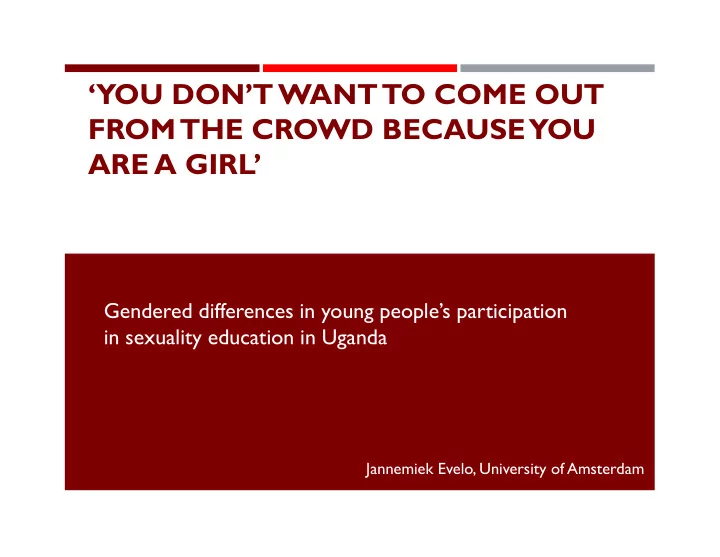

‘YOU DON’T WANT TO COME OUT FROM THE CROWD BECAUSE YOU ARE A GIRL’ Gendered differences in young people’s participation in sexuality education in Uganda Jannemiek Evelo, University of Amsterdam
OVERVIEW Introduction - Relevance of the study - The dance4life programme in Uganda Research methods Findings -Youth participation in the dance4life programme - Gendered differences in participation Implications & recommendations Discussion & questions
INTRODUCTION: RELEVANCE OF THE STUDY Why sexuality education in Uganda? Why youth participation? Why gendered participation?
INTRODUCTION: THE DANCE4LIFE PROGRAMME IN UGANDA
RESEARCH METHODS 3 schools: Bufuula, Butiki, Kivibuka 59 semi-structured interviews - 4 staff members - 30 programme participants (11-15 yrs) - 8 peer educators - 6 teachers - 10 guardians - 1 dance4life ambassador 4 focus group discussions participant observation
FINDINGS: YOUTH PARTICIPATION IN THE DANCE4LIFE PROGRAMME Question-and-answer sessions Dance4life clubs Student leaders No responsibility for young people “Ideas. It is always me, because I have more knowledge and I always pass the information to the leaders, chairperson, mobilisers, 'I want this and this to take place', to the members.” (Lily, school teacher)
FINDINGS: GENDERED DIFFERENCES IN PARTICIPATION Timidity of girls Boys more eager to be leaders Talking to strangers Effect of programme topics “But basically, the boys, the boys feel more free to always speak out their challenges. But the girls, the girls are always very shy. It's only a few that are in school and that will speak out their challenges.” (Amy, peer educator, 19 years) “Those [topics] that affect mainly the girls, the girls don't want to participate. The boys will take the overall lead. But it's like, menstruation, the girls stand back.” (Bella, peer educator, 19 years)
IMPLICATIONS & RECOMMENDATIONS Potential effect on programme outcomes More training for school teachers and peer educators Splitting boys and girls Involving caregivers and community members ‘Whole school approach’ (Mirembe & Davies, 2001) Mirembe, R., & Davies, L. (2001). Is schooling a risk? gender, power relations, and school culture in uganda. Gender and Education, 13 (4), 401-416
DISCUSSION & QUESTIONS THANKYOU! Jannemiek Evelo jannemiek@hotmail.com I +31646593072
Recommend
More recommend